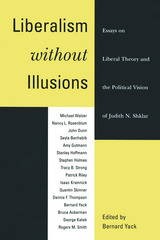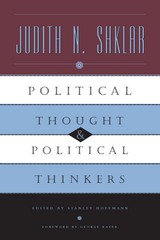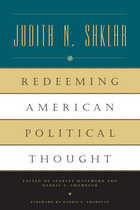

Legalism deals with the area between political theory and jurisprudence. Its aim is to bridge the intellectual gulf separating jurisprudence from other kinds of social theory by explaining why, in the view of historians and political theorists, legalism has fallen short in its approach to both morals and politics. Judith Shklar proposes that, instead of regarding law as a discrete entity resting upon a rigid system of definitions, legal theorists should treat it, along with morals and politics, as part of an all-inclusive social continuum.
The first part of the book examines law and morals and criticizes the approach to morals of both the analytical positivists and the natural law theorists. The second part, on law and politics, deals with legalism as a political ideology that comes into conflict with other policies, particularly during political trials.
Incisively and stylishly written, the book constitutes an open challenge to reconsider the fundamental question of the relationship of law to society.

In this tightly organized collection of essays, sixteen distinguished political theorists explore Shklar's intellectual legacy, focussing on both her own ideas and the broad range of issues that most intrigued her. The volume opens with a series of varied and illuminating assessments of Shklar's conception of liberal politics. The second section, with essays on Descartes and Racine, Hobbes, Rousseau, and Laski, emphasizes the relation between individual freedom and moral psychology in modern political thought. The third section addresses contemporary issues, such as the role of hypocrisy, offensive speech, and constitutional courts in liberal democracies. The book concludes with an autobiographical essay by Shklar that provides a vivid sense of her singular voice and personality.
The contributors to this volume are Bruce Ackerman, Seyla Benhabib, John Dunn, Amy Gutmann, Stanley Hoffmann, Stephen Holmes, George Kateb, Isaac Kramnick, Patrick Riley, Nancy Rosenblum, Quentin Skinner, Rogers M. Smith, Tracy B. Strong, Dennis F. Thompson, Michael Walzer, and Bernard Yack.

Rare is the person who has never known the feelings of apathy, sorrow, and uselessness that characterize the affliction known as melancholy. In this book, one of Europe's leading intellectuals shows that melancholy is not only a psychological condition that affects individuals but also a social and cultural phenomenon that can be of considerable help in understanding the modern middle class. His larger topic is, in fact, modernity in general.
Lepenies focuses not on what melancholy is but on what it means when people claim to be melancholy. His aim is to examine the origin and spread of the phenomenon with relation to particular social milieux, and thus he looks at a variety of historical manifestations: the fictional utopian societies of the Renaissance, the ennui of the French aristocracy in the seventeenth century, the cult of inwardness and escapism among the middle class in eighteenth-century Germany. In each case he shows that the human condition is shaped by historical and societal forces--that apathy, boredom, utopian idealism, melancholy, inaction, and excessive reflection are the correlates of class-wide powerlessness and the failure of purposeful efforts.
Lepenies makes inventive use of an extraordinary range of sociological, philosophical, and literary sources, from Robert Burton's Anatomy of Melancholy to the ideas of contemporary theorists such as Robert K. Merton and Arnold Gehlen. His study gains added richness from its examination of writers whose works express the melancholy of entire social classes--writers such as La Rochefoucauld, Goethe, and Proust. In his masterly analysis of these diverse ideas and texts, he illuminates the plight of people who have been cast aside by historical change and shows us the ways in which they have coped with their distress. Historians, sociologists, psychologists, students of modern literature, indeed anyone interested in the problems of modernity will want to read this daring and original book.

The seven deadly sins of Christianity represent the abysses of character, whereas Judith Shklar’s “ordinary vices”—cruelty, hypocrisy, snobbery, betrayal, and misanthropy—are merely treacherous shoals, flawing our characters with mean-spiritedness and inhumanity.
Shklar draws from a brilliant array of writers—Molière and Dickens on hypocrisy, Jane Austen on snobbery, Shakespeare and Montesquieu on misanthropy, Hawthorne and Nietzsche on cruelty, Conrad and Faulkner on betrayal—to reveal the nature and effects of the vices. She examines their destructive effects, the ambiguities of the moral problems they pose to the liberal ethos, and their implications for government and citizens: liberalism is a difficult and challenging doctrine that demands a tolerance of contradiction, complexity, and the risks of freedom.

This second volume of Shklar's work—which follows the 1997 publication of Redeeming American Political Thought—brings together heretofore uncollected (and several unpublished) essays on a number of themes, including the place of the intellect in the modern political world and the dangers of identity politics. While many of these essays have been previously published, they remain far from accessible. In collecting the work scattered over the past forty years in journals and other publications, noted political theorist Stanley Hoffmann provides an essential guide to Shklar's thought, complemented by George Kateb's comprehensive introduction to her work. Hoffmann's selection, which includes Shklar's classic essay "The Liberalism of Fear," showcases her distinctive defense of liberalism and follows her explorations in this history of moral and political thought as she engages with Bergson, Arendt, and Rousseau.
Political Thought and Political Thinkers displays one of the century's most compelling and flexible intellects in action and is the definitive collection of her work on European history and thinkers.
"Shklar's legacy is an inspiring example of liberal thought at its arresting best, unflinchingly courageous and unmoved by the dreary and unmeaning harmonies conjured up by theories of justice and rights."—John Gray, Times Literary Supplement
Judith N. Shklar (1928-1992) was Cowles Professor of Government at Harvard University and the author of nine books in political theory.

In these thirteen essays, Shklar explores two themes crucial to discussions of American democracy: first, what she terms the "fundamental social condition" of American life, the tension between expansive political equality and persistent social inequality; and second, "redeeming" American political thought for those who believe it lacks the complexity and depth of the European tradition. She covers issues ranging from the use of history in political discourse to the effect of skepticism on politics and thinkers from Hamilton and Jefferson to Melville. The strength and depth of this collection underscore Shklar's reputation as one of this century's most important liberal scholars.
Judith N. Shklar (1928-1992) was Cowles Professor of Government at Harvard University and the author of nine books in political philosophy.
READERS
Browse our collection.
PUBLISHERS
See BiblioVault's publisher services.
STUDENT SERVICES
Files for college accessibility offices.
UChicago Accessibility Resources
home | accessibility | search | about | contact us
BiblioVault ® 2001 - 2024
The University of Chicago Press









